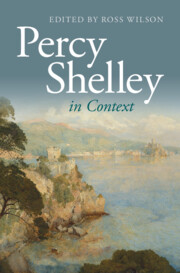Book contents
- Percy Shelley in Context
- Percy Shelley in Context
- Copyright page
- Contents
- Figures
- Contributors
- Preface
- Acknowledgements
- Abbreviations
- Part I Life and Death
- Part II Intellectual, Cultural, and Political Contexts
- Chapter 7 Ancient Philosophy
- Chapter 8 Ancient Poetry
- Chapter 9 English Literature to 1792
- Chapter 10 European Literature, Dante to Rousseau
- Chapter 11 The Visual and Plastic Arts
- Chapter 12 The Radical Press
- Chapter 13 Shelley and the Lake Poets
- Chapter 14 Mary Shelley
- Chapter 15 Thomas Love Peacock
- Chapter 16 Byron and Shelley
- Chapter 17 Keats and Shelley
- Chapter 18 Revolution and Reform
- Chapter 19 Political Economy
- Chapter 20 Empire
- Chapter 21 Shelley’s Sexless Sexuality
- Chapter 22 The British Empiricists
- Chapter 23 The Sciences
- Chapter 24 Religion
- Part III Writings
- Part IV Afterlives
- Further Reading
- Index
Chapter 7 - Ancient Philosophy
from Part II - Intellectual, Cultural, and Political Contexts
Published online by Cambridge University Press: 17 April 2025
- Percy Shelley in Context
- Percy Shelley in Context
- Copyright page
- Contents
- Figures
- Contributors
- Preface
- Acknowledgements
- Abbreviations
- Part I Life and Death
- Part II Intellectual, Cultural, and Political Contexts
- Chapter 7 Ancient Philosophy
- Chapter 8 Ancient Poetry
- Chapter 9 English Literature to 1792
- Chapter 10 European Literature, Dante to Rousseau
- Chapter 11 The Visual and Plastic Arts
- Chapter 12 The Radical Press
- Chapter 13 Shelley and the Lake Poets
- Chapter 14 Mary Shelley
- Chapter 15 Thomas Love Peacock
- Chapter 16 Byron and Shelley
- Chapter 17 Keats and Shelley
- Chapter 18 Revolution and Reform
- Chapter 19 Political Economy
- Chapter 20 Empire
- Chapter 21 Shelley’s Sexless Sexuality
- Chapter 22 The British Empiricists
- Chapter 23 The Sciences
- Chapter 24 Religion
- Part III Writings
- Part IV Afterlives
- Further Reading
- Index
Summary
Shelley’s translation of Plato’s Symposium as The Banquet, composed with great speed over ten days in July 1818, radically transformed the poet’s thoughts on love, translation, originality, and ancient philosophy. Shelley became Shelley through Plato. Rather than an arbiter of forms and banisher of poets from his ideal republic, Shelley’s Plato is himself a poet, as he claims in ‘A Defence of Poetry’. Through his reading and translation of the ancients – and particularly Plato – philosophy and poetry become concomitant for Shelley. Ultimately, Shelley is indebted to the philosopher’s use of literary forms over any straightforward adoption of his philosophy of forms. This chapter looks before and after Shelley’s translation of Plato’s Symposium to trace the poet’s reading of the ancients from 1812 until his accidental death in 1822, revealing the lasting, shifting influence of ancient philosophy on Shelley’s poetry.
- Type
- Chapter
- Information
- Percy Shelley in Context , pp. 51 - 58Publisher: Cambridge University PressPrint publication year: 2025

